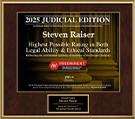
Defenses for Appropriation or Theft of Lost Property Charges
Some powerful defenses exist for defendants facing appropriation or theft of lost property charges, also known as larceny in New York. For prosecutors, it is a matter of proving every element of the law beyond a reasonable doubt. For the defendant, casting doubt on the case concerning any one of the elements, there is a good chance of an acquittal.
Overview of New York’s Appropriation or Theft of Lost Property Laws
The crime of larceny, according to the New York Penal Code is defined as wrongfully taking, obtaining or withholding property from its rightful owner. Receiving a conviction for this form of theft requires the prosecution to prove beyond a reasonable doubt that the defendant accused of stealing the property did so with the specific intent to either:
- make sure the property is permanently or for an extended period withheld from its owner to decrease the value or benefit; or,
- to exercise control or give that control to a third-party permanently or for an extended period to reap the majority of the property’s worth or benefit.
From the moment you are taken into custody and accused of theft, you have a right to legal representation. Hiring a New York criminal defense lawyer should be a priority because without this assistance you can face serious penalties.
Contact Raiser, Kenniff & Lonstein Today
Being confronted with accusations of wrongful appropriation or theft of lost property is an unnerving experience. Such charges require the steady hand of skillful criminal defense lawyers. With offices in New York, Mineola, and Bohemia, Raiser, Kenniff & Lonstein, will explore every avenue to build a solid defense that protects you and your way of life.


Why We're the Right Choice
Attentive Service. Strategic Defense.
Raiser, Kenniff & Lonstein is here to help you get the results you need with a team you can trust.
-
Personalized Legal StrategyWe don’t believe in one-size-fits-all solutions. Every case is handled with a custom legal approach tailored to your goals, your circumstances, and your future.
-
Risk-Free Consultation
We offer a risk-free evaluation of your case and are here to help you understand your legal options. We are available 24/7, day or night, to help you.
-
Top-Rated Team
Nationally recognized for results. Our attorneys have been ranked among the best in the U.S., Trusted for their strategy, skill, and relentless client advocacy
-
Former ProsecutorsOur founding partners are both former New York prosecutors who bring unique experience and insights to every case, especially when it comes to going to trial.

How Larceny is Committed
It takes dedication and skill to defend clients accused of theft of lost property crimes such as:
- Extortion, which occurs when threats or force is used by one person to obtain something from another person. You could face up to seven years in prison if you are convicted of first-degree coercion.
- Embezzlement, which typically occurs in business. This involves stealing assets or funds that were entrusted to you by your employer or the company you own. Embezzlement comes with varying penalties based on the amount of money that you are accused of stealing. The maximum penalty in New York is 25 years in prison.
- Petit larceny is theft of property that is valued at less than $1,000, and comes with a prison sentence of up to one year.
- Grand larceny in New York involves theft of property that is valued at $1,000 or more. There are different degrees of larceny charges that come with penalties between four and 25 years in prison.
Expanded Definitions of Committing Larceny in New York
The courts and state legislature have expanded the definition of what is considered property to include real property, computer data, computer programs or anything of substance and significant value. The accepted market value at the time of the criminal act of theft determines the value of the stolen property. Also considered in the property value is the cost to replace it.
In New York, there are eight recognized methods of committing larceny. The first two are common law larceny by trespassory taking or by trick. Embezzlement and using false pretenses to obtain property are the next two defined in the statutes. Historically, these are the most common recognized forms of larceny.
Four variations define the final four methods. One is larceny by appropriating lost property. The last three are issuing a bad check, making a false promise and extortion. These represent up-to-date derivatives of committing larceny.
Call us at (888)-646-0025 or contact us online. We are available around the clock, and we are standing by to help you.


a Reputation For excellence
Read Our Client Testimonials
-
They treated me wonderfully and helped me out of a bind. I feel that this firm really cares.- Michelle A.







